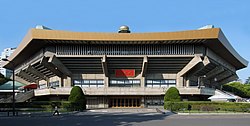| World Popular Song Festival (Yamaha Music Festival) | |
|---|---|
 | |
| Genre | Rock music, |
| Location(s) | Tokyo, Japan |
| Years active | 1970 – 1989 |
| Founded by | Yamaha Music Foundation |
| Website | Official Site by Yamaha Music Foundation |
The World Popular Song Festival (世界歌謡祭, Sekai Kayōsai), also known as Yamaha Music Festival and unofficially as the "Oriental Eurovision", was an international song contest held from 1970 until 1989. It was organised by the Yamaha Music Foundation in Tokyo, Japan from 1970 until 1989. The first edition of the World Popular Song Festival (WPSF) took place on 20, 21 and 22 November 1970 with 37 participating countries from all continents. The concert was cancelled in 1988 due to the illness of the Shōwa Emperor; the final year was a charity concert for UNICEF, after which the contest was formally ended. [1]
History
Belgium was represented at the 1970 edition by Daliah Lavi, famous for her role in Casino Royale (1967), the James Bond parody featuring Woody Allen as well with Samantha Gilles in 1987 ending second with the song Hold Me. Lavi performed the chanson "Prends L'Amour" and ended up 13th in the Grand Final (the contest had two semi-finals and one final). The Netherlands delegated world-known jazz singer Rita Reys with the song "Just Be You", a composition by her husband Pim Jacobs. Czech singer Helena Vondráčková sang "Uncle Charlie" a novelty song inspired by Charlie Chaplin. Other famous 1970 participants were 1969 Eurovision winner Frida Boccara for France, Jacques Michel for Canada and Ted Mulry for Australia, who scored a national number 1 hit with his entry. Winner of the 1st WPSF was Israel with the duo Hedva & David. More than 2 million copies of their winning entry "Ani Holem Al Naomi" ("I Dream Of Naomi") were sold worldwide, giving a serious credibility boost to the new Festival.
Well established names as well as new talents tried their fortune at the WPSF: a very young ABBA under the name Björn & Benny with uncredited backing vocals by their partners Agnetha and Anni-Frid performing the track "Santa Rosa" with little success (later relegated to the B-side of their second single "He Is Your Brother"), Céline Dion (Outstanding Song Award in 1982), Bryan Adams (Participating in 1982), Bucks Fizz (Best Song Award in 1981), Tina Charles, Eros Ramazzotti, Daniela Romo, Gianna Nannini, Demis Roussos, Bonnie Tyler, B.J. Thomas, La Toya Jackson, Erasure, Cissy Houston, Italian singer-songwriter Alice, Mia Martini and many others.
In the history of the WPSF, the United Kingdom has been the most successful, winning the "WPSF Grand Prix" 5 times in the seventies (even three times in row). The United Kingdom is followed by the United States with 4 Grand Prix victories. Smaller countries won as well: Jamaica in 1972 with Ernie Smith, Norway in 1974 with Ellen Nikolaysen, Cuba in 1981 with Osvaldo Rodríguez and Hungary in 1983 with Neoton Família.[ citation needed]
Grand Prix Winners [2]
| Year | Country | Artist | Title |
|---|---|---|---|
| 1970 | Hedva & David | "Ani Holem Al Naomi" | |
| 1971 | Martine Clémenceau | "Un Jour l'Amour" | |
| Tsunehiko Kamijo & Rokumonsen | "Tabidachi No Uta" | ||
| 1972 | Capricorn | "Feeling" | |
| Ernie Smith | "Life is Just for Livin'" | ||
| 1973 | Gilda Giuliani | "Parigi a Volte Cosa Fa" | |
| Shawn Phillips | "All the Kings and Castles" | ||
| Keeley Ford | "Head over Heels" | ||
| Akiko Kosaka | "Anata (You)" | ||
| 1974 | Ellen Nikolaysen | "You Made Me Feel I Could Fly" | |
| 1975 | Mister Loco | "Lucky Man" | |
| Miyuki Nakajima | " Jidai (Time Goes Around)" | ||
| 1976 | Franco & Regina | "Amore Mio" | |
| Sandy | "Goodbye Morning" | ||
| 1977 | Rags | "Can't Hide My Love" | |
| Masanori Sera and Twist | "Anta no Ballade" | ||
| 1978 | Tina Charles | "Love Rocks" | |
| Hiroshi Madoka | "Musoubana (Fly on All the Way)" | ||
| 1979 | Bonnie Tyler | " Sitting on the Edge of the Ocean" | |
| Crystal King | "Daitokai (In the City of Strangers)" | ||
| 1980 | Mary MacGregor | " What's The Use" | |
| 1981 | Osvaldo Rodríguez | "Digamos Que Mas Da" | |
| 1982 | Anne Bertucci | "Where Did We Go Wrong" | |
| Asuka | "Hananusubito" | ||
| 1983 | Neoton Família | "Time Goes By" | |
| 1984 | France Joli | "Party Lights" | |
| 1985 | Valeria Lynch | "Rompecabezas" | |
| 1986 | Stacy Lattisaw | "Longshot" | |
| 1987 | Pseudo Echo | " Take on the World" | |
| 1988 | (the contest was cancelled) | ||
| 1989 | UNICEF Charity Concert | Stevie Wonder, Bonnie Tyler, B. J. Thomas, Dan Hill, Pseudo Echo | "Parents of the World" [3] |
Awards
- Grand Prix International
- Grand Prix National 1975-1982
- Most Outstanding Performance Award (MOPA)
- Outstanding Performance Award (OPA)
- Outstanding Song Award (OSA)
- Kawakami Award
See also
References
- ^ Official Site by Yamaha Music Foundation
- ^ "Yamaha Music". Retrieved 5 April 2022.
- ^ "Wonder Sings for UNICEF" (PDF). Music & Media. Retrieved 4 April 2022.